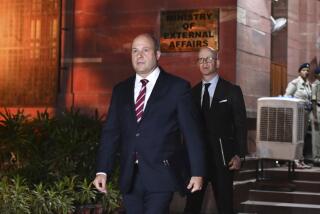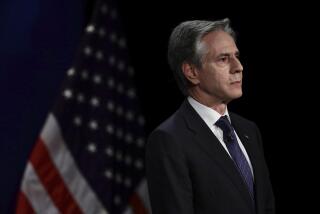U.S. Protests Soviet Ouster of 5 Envoys, Will Retaliate
WASHINGTON — The Reagan Administration, angered by the expulsion of five American diplomats from the Soviet Union, today lodged a formal protest with the Kremlin and will retaliate soon, probably by expelling more Soviets from the United States, officials said today.
An official who spoke on the condition he not be identified said the expected expulsion of Soviet diplomats could come later today or Tuesday.
Another official said, “We are not going to dillydally.”
As it was revealed today that the U.S. diplomats have until Nov. 1 to leave, the U.S. deputy chief of mission in Moscow, Richard Combs, formally protested the Soviet action, and State Department spokesmen Charles Redman said it is “totally without justification and can’t help but have a detrimental effect on relations.”
Redman did not link the expulsion order of the five Americans with continuing post-Reykjavik summit contacts between U.S. and Soviet arms control negotiators. The Soviet action, announced Sunday, is the largest single mass expulsion of Americans from the Soviet Union. (Story on Page 9.)
‘Detrimental Effect’
A senior Administration official told reporters at the White House that although there will be “some detrimental effect,” the arms control talks can proceed on a separate track.
Redman said the United States rejects any “linkage” between the U.S. expulsion of 25 Soviet diplomats assigned to the Soviet mission to the United Nations and the five Americans working in the U.S. Embassy in Moscow.
Foreign Minister Eduard A. Shevardnadze said at a news conference in New York last month, however, that the American order expelling the 25 Soviet diplomats was illegal and would trigger a “significant” Soviet response.
The State Department justified the reduction in the size of the Soviet U.N. mission on the grounds that employees were involved in espionage and that it had become prohibitively expensive for the FBI to keep tabs on such a large number of spies.
The Soviets, under the State Department order, will have to cut their U.N. Mission staff by 40% in a two-year period ending in April, 1988.
More to Read
Sign up for Essential California
The most important California stories and recommendations in your inbox every morning.
You may occasionally receive promotional content from the Los Angeles Times.










